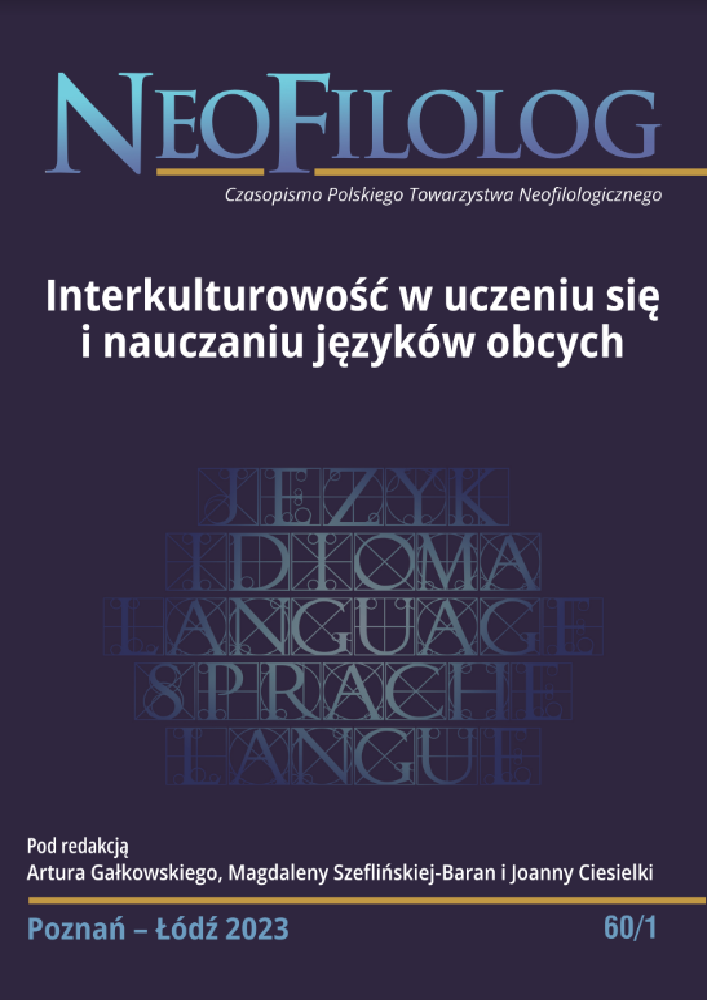Abstract
Recognizing that appellative systems are subjected to particular sociocultural codifications, through this study we try to verify whether the didactic presentation of the address forms, and in particular of the address forms of the Spanish-speaking world, is not limited only to a formal schematization, overlooking the interpretative clues about the scope of use and sociopragmatic conventions. Carrying out the analysis of a few manuals of Spanish as a foreign language, we try to find out what functional values acquire the address forms in the proposed contextualizations. In our approach, we take into account both pronominal and nominal address forms. Similarly, we propose to investigate the question of conceptualizations through which different methods of Spanish as a foreign language reflect the notional contents linked to the contexts of formality and proximity.
References
Baran M. (2010), Emotividad y convención sociopragmática. Una contribución al estudio del ethos comunicativo de la comunidad hispanohablante peninsular. Łódź: Wydawnictwo Uniwersytetu Łódzkiego.
Baran M. (2012), Formas nominales y pronominales de tratamiento: perspectivas de estudios contrastivos en el ámbito sociopragmático. “Studia Iberystyczne”, n° 11, pp. 27-56. DOI: https://doi.org/10.12797/SI.11.2012.11.04
Blas Arroyo J. L. (2005), Sociolingüística del español. Desarrollos y perspectivas en el estudio de la lengua española en contexto social. Madrid: Cátedra.
Bravo D. (2003), Actividades de cortesía, imagen social y contextos socioculturales: una introducción, (en:) Bravo D. (ed.), Actas del Primer Coloquio del Programa EDICE: Perspectiva no etnocentrista de la cortesía: identidad sociocultural de las comunidades hispanohablantes. Stockholms: Stockholms Universitet, pp. 98-107.
Brown P., Levinson S. (1987), Politeness. Some Universals in Language Usage. Cambridge: Cambridge University Press. DOI: https://doi.org/10.1017/CBO9780511813085
Brown R., Gilman A. (1960), The pronouns of Power and Solidarity, (en:) Sebeok T. A. (ed.), Style in Language. New York: Wiley, pp. 253-276.
Fontanella de Weinberg M. B. (1999), Sistemas pronominales de tratamiento usados en el mundo hispánico, (en:) Bosque, I., Demonte, V. (eds.), Gramática Descriptiva de la Lengua Española. Madrid: Espasa Calpe, pp. 1400-1425.
Gassó M. J. (2009), El voseo rioplatense en la clase de español. “redELE”, n° 9, pp. 1-26.
Granvik A. (2007), Formas de tratamiento e interferencia. Estudio sobre el uso de las formas de tratamiento españolas por parte de portugueses nativos residentes en Madrid. “Revista de Filología Románica”, n° 24, pp. 221-250.
Gumperz J. J. (1982), Discourse strategies. Cambridge: Cambridge University Press. DOI: https://doi.org/10.1017/CBO9780511611834
Kerbrat-Orecchioni C. (1995), La construction de la relation interpersonnelle: quelques remarques sur cette dimension du dialogue. “Cahiers de Linguistique Française”, n° 16, pp. 69-88.
Kerbrat-Orecchioni C. (2005), Le discours en interaction. Paris: Armand Colin.
López López G., Martínez Franco S. P. (2022), Los significados sociales de las formas de tratamiento ‘tú’ y ‘usted’ en Bogotá, Colombia y sus implicaciones en la enseñanza de español como lengua extranjera. “Revista Signos. Estudios de Lingüística”, n° 55(108), pp. 417-450. DOI: https://doi.org/10.4067/S0718-09342022000100417
Mas Álvarez I. (2014), Formas de tratamiento y enseñanza del español como lengua extranjera. “redELE”, n° 26, pp. 1-16. DOI: https://doi.org/10.14483/udistrital.jour.calj.2014.1.a02
Pop L. (2006), Peut-on parler du style interjectif ? Le cas du roumain. “Langages”, n° 161, pp. 24-36. DOI: https://doi.org/10.3917/lang.161.0024
Roselló Verdeguer J. (2018), Las formas de tratamiento en el corpus PRESEEA-Valencia. Un estudio sociolingüístico. “CLAC (Círculo de Lingüística aplicada a la comunicación)”, n° 76, pp. 241-260. DOI: https://doi.org/10.5209/CLAC.62507
Sánchez Avendaño C. (2004), Variación morfosintáctica y enseñanza del español como lengua extranjera: reflexiones de un lingüista metido a profesor. “Filología y Lingüística”, n° XXX (2), pp. 131-154. DOI: https://doi.org/10.15517/rfl.v30i2.4442
Wolarska A. (2004), Pragmalingwistyczna analiza form adresatywnych w języku polskim i hiszpańskim (rozprawa doktorska). Poznań: Uniwersytet im. Adama Mickiewicza.
Corpas J., García E., Garmendia A., Soriano C. (2005), Aula Internacional 1, Barcelona: Difusión.
Corpas J., García E., Garmendia A., Soriano C. (2015), Aula Internacional 2, Barcelona: Difusión.
Corpas J., Garmendia A., Sánchez N., Soriano N. (2007), Aula Internacional 4, Barcelona: Difusión.
Encina A., Corpas J., Gambluch C. (2015), Diverso 1, Madrid: SGEL.
Martín Peris E., Sánchez Quintana N., Sans Baulenas N., Vañó Aymat A. (2005), Gente 2, Barcelona: Difusión.
Martín Peris E., Sans Baulenas (2005), Gente 3, Barcelona: Difusión.
Nieto-Kuczyńska D., Nieto-Rasiński D. E. (2012), Arcoíris A1-A2. Podręcznik do nauki języka hiszpańskiego, Wrocław: Przystanek EDU S. C.
Sans N., Martín Peris (2013), Gente hoy 1, Barcelona: Difusión.
License
Copyright (c) 2023 Marek Baran

This work is licensed under a Creative Commons Attribution-NoDerivatives 4.0 International License.
Authors
Authors of texts accepted for publication in Neofilolog are required to complete, sign and return to the Editorial team’s office the Agreement for granting a royalty-free license to works with a commitment to grant a CC sub-license.
Under the agreement, the authors of the texts published in Neofilolog grant Adam Mickiewicz University in Poznań a non-exclusive, royalty-free license and authorize the use of Attribution-NoDerivatives 4.0 International (CC BY-ND 4.0) Creative Commons sub-license.
The authors retain the right to the free disposal of the work.
Users
Interested Internet users are entitled to use works that have been published in Neofilolog since 2017, under the following conditions:
▪ attribution – obligation to provide, together with the distributed work, information about the authorship, title, source (link to the original work, DOI) and the license itself.
▪ no derivatives – the work must be preserved in its original form. Without the author's consent, it is not possible to distribute the modified work in the form of translations, publications, etc.
Copyrights are reserved for all texts published since 2017.
Miscellaneous
Adam Mickiewicz University in Poznań retains the property right as a whole (layout, graphic form, title, cover design, logo etc.).

